一般过去时的用法
一般过去时 用法
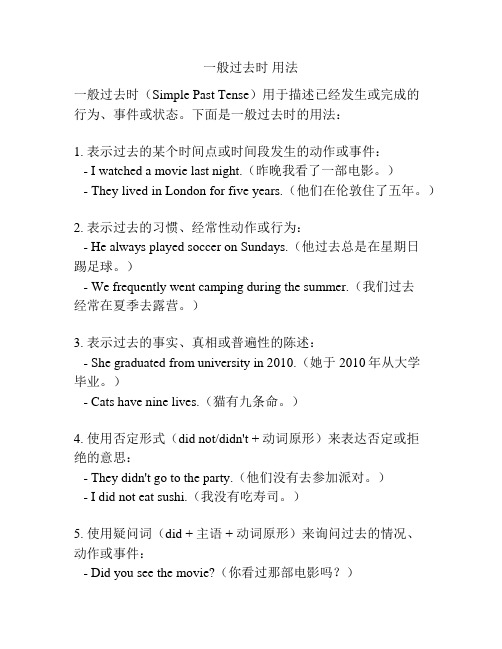
一般过去时用法一般过去时(Simple Past Tense)用于描述已经发生或完成的行为、事件或状态。
下面是一般过去时的用法:1. 表示过去的某个时间点或时间段发生的动作或事件:- I watched a movie last night.(昨晚我看了一部电影。
)- They lived in London for five years.(他们在伦敦住了五年。
)2. 表示过去的习惯、经常性动作或行为:- He always played soccer on Sundays.(他过去总是在星期日踢足球。
)- We frequently went camping during the summer.(我们过去经常在夏季去露营。
)3. 表示过去的事实、真相或普遍性的陈述:- She graduated from university in 2010.(她于2010年从大学毕业。
)- Cats have nine lives.(猫有九条命。
)4. 使用否定形式(did not/didn't + 动词原形)来表达否定或拒绝的意思:- They didn't go to the party.(他们没有去参加派对。
)- I did not eat sushi.(我没有吃寿司。
)5. 使用疑问词(did + 主语 + 动词原形)来询问过去的情况、动作或事件:- Did you see the movie?(你看过那部电影吗?)- Did he go to the concert with you?(他和你一起去听音乐会了吗?)需要注意的是,一般过去时的动词变化规则为动词原形后加上-ed或-d,但也有一些特殊动词的变化形式需要记忆(如go变为went)。
一般过去时和过去进行时的用法详解

一般过去时和过去进行时的用法详解一、一般过去时的用法一般过去时用于表示在过去某个特定时间或某个过去的时间段发生的动作或存在的状态。
以下是一般过去时的具体用法和相关示例:1. 表示过去的经常性动作或状态:- He played football every Saturday.(他每个星期六踢足球。
)- She always wore a red dress to parties.(她去派对时总是穿红色连衣裙。
)2. 表示过去的完成动作:- I finished my homework last night.(我昨晚完成了作业。
)- They visited their grandparents during the summer vacation.(他们在暑假期间拜访了他们的祖父母。
)3. 表示过去的习惯或特定时间段内的活动:- When he was young, he used to swim in the river every morning.(他年轻时,他习惯每天早上在河里游泳。
)- We lived in London for five years.(我们在伦敦住了五年。
)4. 表示过去的时间状语:- She traveled to Paris last summer.(上个夏天她去了巴黎。
)- He studied French when he was in college.(他上大学时学过法语。
)二、过去进行时的用法过去进行时用于表示过去某个时间点或某个时间段内正在进行的动作。
以下是过去进行时的具体用法和相关示例:1. 表示过去某一时刻正在进行的动作:- They were having dinner at 7 pm yesterday.(昨天晚上7点他们正在吃晚饭。
)- I was watching TV when the phone rang.(电话响的时候我正在看电视。
)2. 表示过去某个时间段内正在进行的动作:- She was studying all day yesterday.(昨天她一整天都在学习。
一般过去时的用法与定义详细

一般过去时的用法与定义详细一般过去时是英语学习者学习以及英语从教者教授的一大难点,其用法你了解多少呢?以下是由店铺整理关于一般过去时的用法的内容,希望大家喜欢!一般过去时的用法一、概述1.表示在的过去某个时间里所发生的动作或存在的状态。
时间状语有:yesterday, last week, an hour ago, in 1982等。
如:1)I was at the zoo yesterday. 昨天我在动物园。
2)I went to bed at eleven last nigth. 昨晚我11:00睡觉。
2.表示在过去一段时间内,经常性或习惯性的动作。
1)When I was a child, I often played football in the street. 我在小的时候,我经常在街道上踢足球。
2)My father often drove to work last year. 去年,我爸爸经常开车上班。
二、句子结构1.在表示某个时间里存在的状态的句子,系动词用过式was,were构成。
如:(1)I was at home yesterday. 昨天我在家。
(2)We were in the gym just now. 刚才我们在体育馆。
2.在表示过去某个时间里发生的动作,用动词的过去式构成。
如:I visited my uncle yesterday. 昨天我拜访了我的叔叔。
3.各种句式(1)一般过去时的肯定陈述句:主语 + 动词过去式 + 宾语或表语。
He worked in Shanghai ten years ago.(2)一般过去时的否定句:a.主语+ didn’t + 动词原形 + 宾语。
(did + not = didn't)He didn't do morning exercises yesterday. b.主语+ wasn’t/weren’t +表语。
英语语法一般过去时的用法

英语语法一般过去时的用法一般过去时表示过去某个时间里发生的动作或状态;过去习惯性、经常性的动作、行为。
在英语语法中,“时“指动作发生的时间,”态“指动作的样子和状态。
下面是小编为您收集整理的英语语法一般过去时的用法,供大家参考!英语语法一般过去时的用法一般过去时1.一般过去时表示过去某个时间发生的动作或存在的状态,常和表示过去的时间状语连用。
一般过去时也表示过去经常或反复发生的动作感谢。
2.Be动词在一般过去时中的变化:⑴am和is在一般过去时中变为was(was not=wasn’t)⑵are在一般过去时中变为were(were not=weren’t)⑶带有was或were的句子,其否定、疑问的变化和is, am, are 一样,即否定句在was或were后加not,一般疑问句把was或were 调到句首。
3.句中没有be动词的一般过去时的句子否定句:didn’t +动词原形,如:Jim didn’t go home yesterday.一般疑问句:在句首加did,句子中的动词过去式变回原形。
如:Did Jim go home yesterday?特殊疑问句:⑴疑问词+did+主语+动词原形?如:What did Jim do yesterday?⑵疑问词当主语时:疑问词+动词过去式?如:Who went to home yesterday?动词过去式变化规则:1.一般在动词末尾加-ed,如:pull-pulled, cook-cooked2.结尾是e加d,如:taste-tasted3.末尾只有一个元音字母和一个辅音字母的重读闭音节,应双写末尾的辅音字母,再加-ed,如:stop-stopped4.以“辅音字母+y”结尾的,变y为i,再加-ed,如:study-studied5.不规则动词过去式:am,is-was, are-were, do-did, see-saw, say-said, give-gave, get-got, go-went, come-came, have-had, eat-ate, take-took, run-ran, sing-sang, put-put, make-made, read-read, write-wrote, draw-drew, drink-drank, fly-flew, ride-rode, speak-spoke, sweep-swept, swim-swam, sit-sat过去时练习写出下列动词的过去式is\am_______ fly_______ plant_______ are_______drink_______ play_______ go_______ make_______does_______ dance_______ worry________ ask_______taste_______ eat_______ draw________ put_______throw_______ kick_______ pass_______ do_______语法讲解一般过去时也叫单纯过去时。
一般过去时的使用范围

一般过去时的使用范围摘要:一、一般过去时的定义与应用场景二、一般过去时的使用范围1.动作或状态发生在过去某个具体时间2.描述过去习惯性动作或状态3.转述他人过去的经历或陈述事实4.表达过去某个时间点的客观事实正文:一般过去时(Simple Past Tense)是英语中的一种时态,表示过去某个时间发生的动作或存在的状态。
它在日常交流、书面表达等各种场景中都有广泛的应用。
下面我们来详细了解一下一般过去时的使用范围。
1.动作或状态发生在过去某个具体时间一般过去时可以用来描述过去某个具体时间点发生的动作或状态。
例如:- I watched a movie yesterday.(我昨天看了一部电影。
)- She visited her grandparents last week.(她上周拜访了她的祖父母。
)2.描述过去习惯性动作或状态一般过去时还可以表示过去某个时间段内经常发生的动作或存在的状态。
例如:- He usually went to the gym after work.(他下班后通常去健身房。
)- She was a good student in high school.(她高中时是个优秀的学生。
)3.转述他人过去的经历或陈述事实在转述他人过去的经历或陈述事实时,我们也可以使用一般过去时。
例如:- He said he had visited many countries.(他说他去过很多国家。
)- She explained that she had studied English for five years.(她解释说她学英语已经五年了。
)4.表达过去某个时间点的客观事实一般过去时还可以用来表达过去某个时间点的客观事实。
例如:- The sun rose in the east.(太阳从东方升起。
)- The plane landed safely at the airport.(飞机安全降落在机场。
一般过去时的使用方法

一般过去时的使用方法1.表示过去的时间状语一般过去时经常与表示过去的时间状语连用,如yesterday(昨天),last week(上周),in 1990(在1990年),等等。
这些时间状语可以帮助我们明确动作或事件发生的具体时间,进一步强调动作或事件的过去性质。
例如:- I went to the movies yesterday.(我昨天去看电影了。
)- They lived in Italy in 2005.(他们2005年在意大利住过。
)2.动词的过去式形式在一般过去时中,动词的过去式形式与主语保持一致,无论主语是第一人称、第二人称还是第三人称单数或复数。
大多数动词的过去式是在原型动词后面加上了-ed,但也有很多不规则动词需要记忆。
例如:- I played basketball with my friends.(我和朋友们打篮球。
)- He walked to the store.(他走去商店了。
)- We studied French for three years.(我们学了三年法语。
)- They went to the beach last summer.(他们去年夏天去了海滩。
)3.否定句和疑问句在一般过去时中,构成否定句和疑问句也有其特定的句式。
在构造否定句时,在动词前加上助动词did not或didn't,表示过去的否定。
在构造疑问句时,在句首加上助动词did,然后将主动词还原成原型。
例如:- She didn't go to the party last night.(她昨晚没去派对。
)- Did you see that movie? (你看过那部电影吗?)- We didn't eat dinner at the restaurant.(我们没在餐馆吃晚饭。
)- Did they visit their grandparents over the weekend?(他们周末去看望他们的祖父母了吗?)4.将近过去时例如:- I had been going to visit my friend, but I got sick.(我原本计划去看望我的朋友,但我生病了。
一般过去时用法和结构

一般过去时用法和结构一般过去时,那可真是英语时态里的一个“小机灵鬼”呢!一般过去时就是用来描述过去某个时间里发生的动作或者状态。
比如说,I went to the park yesterday.(我昨天去公园了)。
这里的“went”就是“go”的一般过去式,很明显是发生在昨天这个过去的时间里的动作。
在结构上呀,如果是be动词,那就是主语+was/were+其他。
像He was at home last night.(他昨晚在家)。
要是实义动词呢,就是主语+动词的过去式+其他。
就像She played basketball last week.(她上周打篮球了)。
动词的过去式可有意思啦,有些是规则变化,就像直接加 -ed 的,像work变成worked;还有以e结尾的直接加 -d,比如like 变成liked。
但也有调皮的不规则变化,像go变成went,eat变成ate。
这就像是每个动词都有自己独特的小脾气一样。
我们在日常生活里经常会用到一般过去时呢。
当你和朋友聊天,说I saw a really cute dog on my way to school this morning.(我今天早上上学路上看到一只超可爱的狗),这就是在分享过去发生的事情呀。
又或者当你在讲述自己的经历,比如I visited my grandparents last month.(我上个月去看望我的爷爷奶奶了)。
它就像是一把钥匙,能打开我们过去的记忆盒子,把那些有趣的、难忘的事情分享出来。
而且在故事里,一般过去时也是常客。
比如The little boy ran away from home yesterday.(小男孩昨天离家出走了),这一下子就能把我们带入到故事的情节当中去。
我们在学英语的时候,可不能小瞧一般过去时哦。
要是用错了,那可就像把衣服穿反了一样别扭。
它能让我们准确地传达过去的信息,让别人能清楚地了解我们想要分享的过去的事情。
一般过去式的结构,用法,含义及标志性时间状语

一般过去式的结构,用法,含义及标志性时间状语【精选】一、一般过去时的基本结构:1、肯定句“主语+动词过去式+其他”或者“主语+was/were +其他”。
【举例】 I played tennis last weekend. 我上周末打网球了。
My school trip was great. 我的学校郊游棒极了。
2、否定句“主语+didn’t+动词原形+其他”或“主语+wasn’t/weren’t+其他”。
【举例】 The girl didn’t play computer games yesterday afternoon.这个女孩昨天下午没玩电子游戏。
Old Henry wasn’t happy last Friday. 上星期五老亨利不高兴。
3、一般疑问句“Did+主语+动词原形+其他?”肯定回答为“Yes,主语+did”。
否定回答为“No,主语+didn’t”或者“Was/Were+主语+其他?”肯定回答为“Yes,主语+was/were”。
否定回答为“No,主语+wasn’t/weren’t”。
【举例】— Did you go to the beach? 你们去海滩了吗?— Yes, we did./No, we didn’t. 是的,我们去了。
/不,我们没有。
— Was your weekend OK? 你的周末过得还行吧?— Yes, it was./No, it wasn’t. 是的,还行。
/不,不行。
4、特殊疑问句:特殊疑问词+一般疑问句(顺序)?【举例】— What did Li Lei do last weekend? 李雷上周末干什么了?— He visited his grandparents. 他去看了他的祖父母。
— Where were you yesterday? 你昨天在哪儿?— I was at home. 我在家里。
二、一般过去时的基本用法:一般过去时表示过去某个时间发生的动作或存在的状态,也可表示过去经常或反复发生的动作。
一般过去时的讲解用法
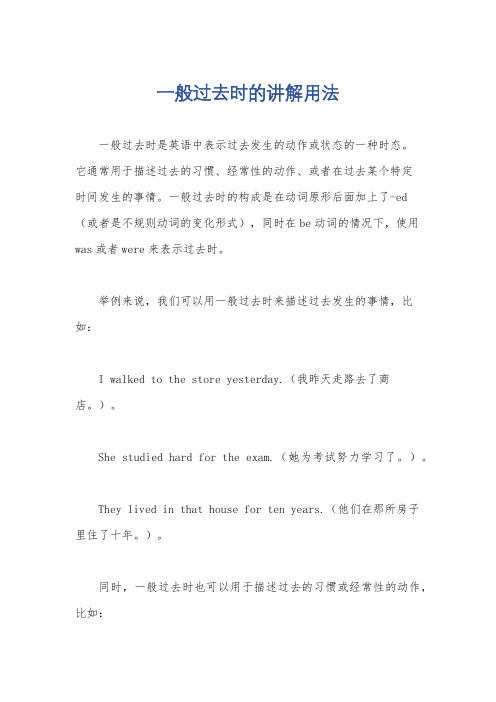
一般过去时的讲解用法
一般过去时是英语中表示过去发生的动作或状态的一种时态。
它通常用于描述过去的习惯、经常性的动作、或者在过去某个特定
时间发生的事情。
一般过去时的构成是在动词原形后面加上了-ed
(或者是不规则动词的变化形式),同时在be动词的情况下,使用was或者were来表示过去时。
举例来说,我们可以用一般过去时来描述过去发生的事情,比如:
I walked to the store yesterday.(我昨天走路去了商店。
)。
She studied hard for the exam.(她为考试努力学习了。
)。
They lived in that house for ten years.(他们在那所房子
里住了十年。
)。
同时,一般过去时也可以用于描述过去的习惯或经常性的动作,比如:
She always played the piano after dinner.(她过去总是在晚饭后弹钢琴。
)。
He never ate vegetables when he was a child.(他小时候从不吃蔬菜。
)。
需要注意的是,一般过去时有时候也可以用于表示虚拟语气,比如在if条件句中,表示与现在事实相反的情况:
If I had known, I would have helped.(如果我当时知道的话,我本来会帮忙的。
)。
总的来说,一般过去时是用来描述过去发生的事情、习惯或经常性动作的时态,它是英语中非常基础和常用的时态之一。
希望这样的解释能够帮助你理解一般过去时的用法。
一般过去时的用法
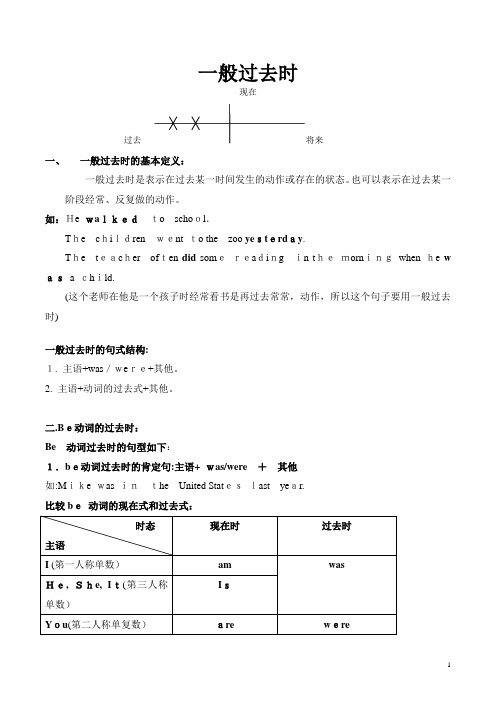
一般过去时现在过去将来一、 一般过去时的基本定义:一般过去时是表示在过去某一时间发生的动作或存在的状态。
也可以表示在过去某一阶段经常、反复做的动作。
如:He wa lked to scho ol .T he c hi ldren went to the zoo ye st erd ay .T he t eac her of ten did som e rea di ng in t he morn ing when he w as a ch ild.(这个老师在他是一个孩子时经常看书是再过去常常,动作,所以这个句子要用一般过去时)2. 主语+动词的过去式+其他。
二.B e动词的过去时: Be 动词过去时的句型如下:1.b e动词过去时的肯定句:主语+ was/were + 其他 如:M ike was in the United Stat es last ye ar. 比较b e 动词的现在式和过去式: 一般过去时的句式结构: 1. 主语+was /we re+其他。
如:Iwasvery tiredlast night.Youwere absentfrom school two daysago.There weresome booksthere. (那儿曾经有一些书。
)注意:Therebe句型用于一般过去时需把is/are 变为它们的过去式:There was (were) …2. Be动词过去时的否定句:主语+was/were+not+其他He wasnot inCanadalast year.Be 过去式的否定句结构,只要在was/were后面加上not 就可以了。
它的缩写形式为:wasn’t 和weren’t如:Iwasn’tbusy yesterday.There weren’t any boys in the room.3. Be动词过去时的疑问句:(1)was/were+ 主语+其他(一般疑问句)----Wasit rainingin Beijingyesterday?----No,itwasn’t. It was cloudy.(2)特殊疑问词+were/was+主语+其他(特殊疑问句)----Where were youyesterdaymorning?----I was atschool.Be动词过去式一般疑问句的结构,只要把was/were 提到主语前面,some变any ,and变成or.回答时,Yes, … was/were.No, … wasn’t/weren’t.以疑问词开始的特殊疑问句,回答时,不能用Yes, No.直接回答所问的问题即可。
一般过去时结构与用法
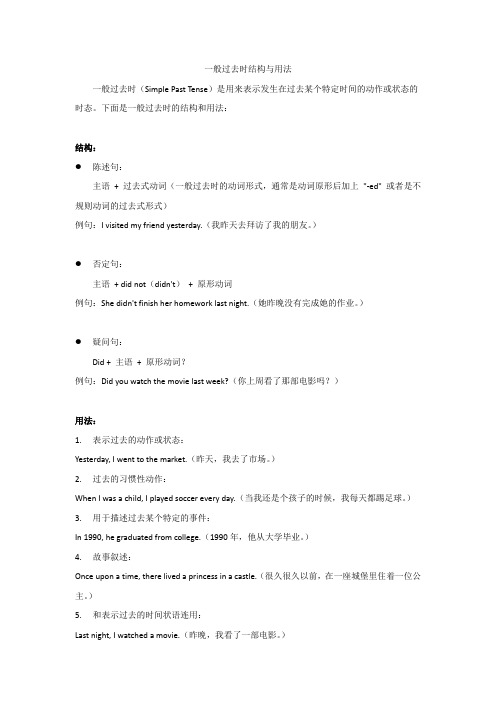
一般过去时结构与用法一般过去时(Simple Past Tense)是用来表示发生在过去某个特定时间的动作或状态的时态。
下面是一般过去时的结构和用法:结构:●陈述句:主语+ 过去式动词(一般过去时的动词形式,通常是动词原形后加上"-ed" 或者是不规则动词的过去式形式)例句:I visited my friend yesterday.(我昨天去拜访了我的朋友。
)●否定句:主语+ did not(didn't)+ 原形动词例句:She didn't finish her homework last night.(她昨晚没有完成她的作业。
)●疑问句:Did + 主语+ 原形动词?例句:Did you watch the movie last week?(你上周看了那部电影吗?)用法:1.表示过去的动作或状态:Yesterday, I went to the market.(昨天,我去了市场。
)2.过去的习惯性动作:When I was a child, I played soccer every day.(当我还是个孩子的时候,我每天都踢足球。
)3.用于描述过去某个特定的事件:In 1990, he graduated from college.(1990年,他从大学毕业。
)4.故事叙述:Once upon a time, there lived a princess in a castle.(很久很久以前,在一座城堡里住着一位公主。
)5.和表示过去的时间状语连用:Last night, I watched a movie.(昨晚,我看了一部电影。
)请注意,对于不规则动词,其过去时形式并不是简单地在动词后加上"-ed",而是有规定的形式,需要记忆。
例如,动词"go" 的过去式是"went",而不是"goed"。
一般过去时用法

一般过去时用法一般过去时是英语中最常用的过去时态之一,用于描述过去发生的动作、事件或状态。
本文将介绍一般过去时的用法、时态转换、标志词及常见注意事项。
一、一般过去时的用法一般过去时用于以下情况:1. 过去发生的具体动作或事件:- We went to the beach last summer.(我们去年夏天去了海滩。
)- He cooked dinner yesterday.(他昨天做了晚餐。
)2. 过去的习惯或经常性动作:- She always walked to school when she was young.(她小时候总是步行去学校。
)- We used to play basketball every Saturday.(我们过去每个星期六都会打篮球。
)3. 对现在具有影响的过去经历或经验:- I learned how to swim when I was a child, and now I love swimming.(我小时候学会游泳了,现在我非常喜欢游泳。
)- They lived abroad for five years and now they can speak fluent English.(他们在国外生活了五年,现在能够说一口流利的英语。
)二、时态转换1. 肯定句:一般过去时的肯定句结构为:主语 + 动词过去式(或助动词did + 动词原形)+ 其他。
- I studied Chinese for three years.(我学了三年中文。
)- She played tennis with her friends yesterday.(她昨天和朋友们打网球。
)2. 否定句:一般过去时的否定句结构为:主语 + did not (didn't) + 动词原形 +其他。
- We didn't go to the party last night.(我们昨晚没有去参加派对。
一般过去时四种用法

一般过去时四种用法①表示在过去某个时间发生的动作或情况。
例如:I went to school at 7:00 yesterday morning.我昨天早晨七点去上学。
②表示在过去某个时间存在的状态。
例如:She was not at home last night.她昨晚八点没在家。
③表示在过去经常或反复发生的动作,常和often(经常)、always(总是)、sometimes(有时)等表示频率的时间状语连用。
例如:He often had lunch at school last month.他上个月经常在学校吃午饭。
④表示已故的人所做的事情或情况。
例如:Ba Jin wrote a lot of novels for us.巴金写了很多部小说。
四种时间状语①yesterday 及相关短语。
例yesterdaymorning/afternoon/ev ening 昨天上午/下午/晚上。
② “last+ 时间状语”构成的短语。
例如:lastnight/month/spring/year 昨晚/上个月/去年春天/去年。
③“一段时间+ago”组成的短语。
例如:three days ago 三天以前 four years ago四年以前。
④ “介词+ 时间名词”组成的短语。
例如:in 1999 在1999年;on the morning of December 25th 在12月25号早上。
四种谓语动词的表现形式①be动词的过去式was、were.例如:She was a teacher five years ago. 她五年前是一名教师。
②行为动词的过去式,分为规则动词和不规则动词两种。
规则动词的过去式的构成遵循以下四个规则:1)直接在动词后加ed,例如:help-helped; want-wanted等;2)以不发音的字母e结尾时,去掉e加ed (即直接加d) , 例如:like-liked; use-used等;3)以辅音字母y结尾时,把y变成i再加ed, 例如:carry-carried; study-studied等;4)以重读闭音节结尾,双写最后一个辅音字母再加ed, 例如:stop-stopped; shop-shopped等。
一般过去时的用法

一般过去时的用法(1) 一般过去时表示在过去某个特定时间发生,也可以表示过去习惯性、经常性的动作。
一般过去时不强调动作对现在的影响,只说明过去的事情。
句式:主语+过去动词+宾语+其他I had a word with Julia this morning.今天早晨,我跟朱丽亚说了几句话。
He smoked many cigarettes a day until he gave up. 他没有戒烟的那阵子,抽烟抽得可凶了。
用法(2) 一般过去时常与表示过去的时间状语或从句连用,如:yesterday, last week, in 1993, at that time, once, during the war, before,a few days ago, when 等等。
补充内容:(句子中谓语动词是用一般过去时还是用现在完成时,取决于动作是否对现在有影响。
Have you had your lunch? 你吃过午饭了吗?(你现在不饿吗?)Yes, I have.是的,我已经吃过了。
(已经吃饱了,不想再吃了。
)When did you have it? 你是什么时候吃的?(关心的是吃的动作发生在何时。
)I had it about ten minutes ago. 我大约是十分钟以前吃的。
)Used to do something 表示过去常做而现在已经停止了的习惯动作。
I used to work fourteen hours a day. 我过去常常一天干十四个小时。
I ate it at 6:45。
我在六点四十五分吃了。
(3)带有确定的过去时间状语时,要用过去时。
如:yesterday(昨天)、two days ago…(两天前…… )、last year…(去年…)、the other day (前几天)、once upon a time(很久以前)、just now(刚才)、in the old days(过去的日子里)、before liberation(解放前…)、When I was 8 years old(当我八岁时…)、at+一个时间点Did you have a party the other day?前几天,你们开了晚会了吗?Lei Feng was a good soldier.雷锋是个好战士。
一般过去时的用法及结构笔记

一般过去时的用法及结构笔记(最新版)目录一、一般过去时的概念二、一般过去时的构成1.动词过去式2.疑问句和否定句的构成三、一般过去时的用法1.表示过去某个特定时间发生的动作或存在的状态2.表示过去经常或反复发生的动作3.表示过去习惯性的动作或状态4.表示过去事实的真相四、一般过去时与现在完成时的区别正文一、一般过去时的概念一般过去时是英语时态中的一种,用来表示过去某个特定时间发生的动作或存在的状态。
它是一种基本的时态,用于描述过去发生的事情,与现在时和将来时共同构成了英语的三种基本时态。
二、一般过去时的构成一般过去时的构成相对简单,主要由两部分组成:动词的过去式和相应的助动词。
1.动词过去式:动词的过去式是动词在一般过去时中的形式,通常通过在动词原形后加-ed 构成,如 work(工作)的过去式是 worked,run(跑)的过去式是 ran。
然而,有些不规则动词的过去式形式并不遵循这个规则,如 go(去)的过去式是 went,be(是)的过去式是 was 或 were。
2.疑问句和否定句的构成:在一般过去时中,疑问句的构成是将助动词 did 加到句子的主语前,如 Did you go to the park yesterday?(你昨天去公园了吗?);否定句的构成是在动词前加助动词 did not,如 I did not watch TV last night(我昨晚没有看电视)。
三、一般过去时的用法一般过去时主要有以下几种用法:1.表示过去某个特定时间发生的动作或存在的状态,如 I ate breakfast at 7 o"clock this morning(我今天早上七点吃了早餐)。
2.表示过去经常或反复发生的动作,如 I used to go to the movies every weekend(我过去常常每周末去看电影)。
3.表示过去习惯性的动作或状态,如 She always arrived on time (她总是准时到达)。
一般过去时的用法
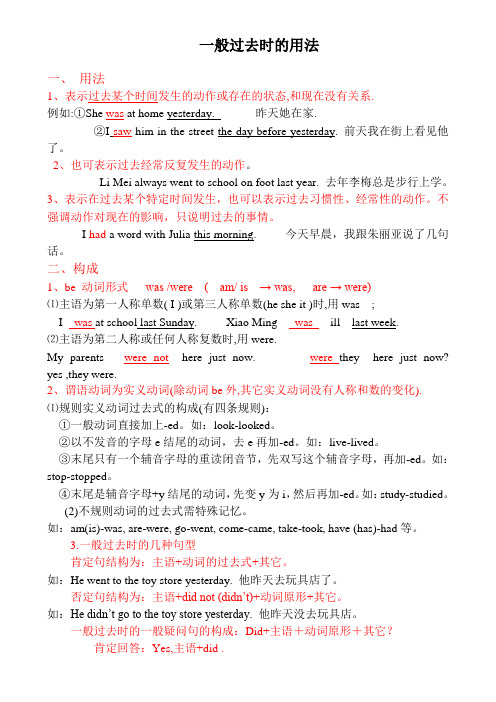
一般过去时的用法一、用法1、表示过去某个时间发生的动作或存在的状态,和现在没有关系.例如:①She was at home yesterday. 昨天她在家.②I saw him in the street the day before yesterday. 前天我在街上看见他了。
2、也可表示过去经常反复发生的动作。
Li Mei always went to school on foot last year. 去年李梅总是步行上学。
3、表示在过去某个特定时间发生,也可以表示过去习惯性、经常性的动作。
不强调动作对现在的影响,只说明过去的事情。
I had a word with Julia this morning. 今天早晨,我跟朱丽亚说了几句话。
二、构成1、be 动词形式was /were ( am/ is → was, are → were)⑴主语为第一人称单数( I )或第三人称单数(he she it )时,用was ;I was at school last Sunday. Xiao Ming was ill last week.⑵主语为第二人称或任何人称复数时,用were.My parents were not here just now. were they here just now? yes ,they were.2、谓语动词为实义动词(除动词be外,其它实义动词没有人称和数的变化).⑴规则实义动词过去式的构成(有四条规则):①一般动词直接加上-ed。
如:look-looked。
②以不发音的字母e结尾的动词,去e再加-ed。
如:live-lived。
③末尾只有一个辅音字母的重读闭音节,先双写这个辅音字母,再加-ed。
如:stop-stopped。
④末尾是辅音字母+y结尾的动词,先变y为i,然后再加-ed。
如:study-studied。
(2)不规则动词的过去式需特殊记忆。
如:am(is)-was, are-were, go-went, come-came, take-took, have (has)-had等。
- 1、下载文档前请自行甄别文档内容的完整性,平台不提供额外的编辑、内容补充、找答案等附加服务。
- 2、"仅部分预览"的文档,不可在线预览部分如存在完整性等问题,可反馈申请退款(可完整预览的文档不适用该条件!)。
- 3、如文档侵犯您的权益,请联系客服反馈,我们会尽快为您处理(人工客服工作时间:9:00-18:30)。
一般过去时
现在
过去
将来
一、 一般过去时的基本定义:
一般过去时是表示在过去某一时间发生的动作或存在的状态。
也可以表示在过去某一阶段经常、反复做的动作。
如:He walked to school.
The children went to the zoo yesterday .
The teacher often did some reading in the morning when he was a child.
(这个老师在他是一个孩子时经常看书是再过去常常,动作,所以这个句子要用一般过去时)
2. 主语+动词的过去式+其他。
二.Be 动词的过去时: Be 动词过去时的句型如下:
1.be 动词过去时的肯定句:主语+ was/were + 其他 如:Mike was in the United States last year. 比较be 动词的现在式和过去式:
如:I was very tired last night.
一般过去时的句式结构: 1. 主语+was/were+其他。
You were absent from school two days ago.
There were some books there. (那儿曾经有一些书。
)
注意:There be 句型用于一般过去时需把is /are 变为它们的过去式:There was (were) …
2. Be动词过去时的否定句:主语+ was/were + not + 其他
He was not in Canada last year.
Be 过去式的否定句结构,只要在was/were 后面加上not 就可以了。
它的缩写形式为:wasn’t 和weren’t
如:I wasn’t busy yesterday.
There weren’t any boys in the room.
3. Be动词过去时的疑问句:
(1)was/were + 主语+其他(一般疑问句)
----Was it raining in Beijing yesterday?
----No, it wasn’t. It was cloudy.
(2)特殊疑问词+ were/was +主语+其他(特殊疑问句)
----Where were you yesterday morning?
----I was at school.
Be动词过去式一般疑问句的结构,只要把was/were 提到主语前面,some 变any , and 变成or.
回答时,Yes, … was/were.
No, … wasn’t/weren’t.
以疑问词开始的特殊疑问句,回答时,不能用Yes, No. 直接回答所问的问题即可。
如:--- Was your father free this morning?
--- Yes, he was.
--- No, he wasn’t.
--- Was there any water in the bottle?
--- Yes, there was.
--- No, there wasn’t.
三.一般动词的过去时(不含be 动词)
一般动词(不含be动词)过去时的基本句型如下:
1.肯定句:主语+ 动词的过去式+ 其它
We had a good time yesterday.
He had a good time yesterday.
一般动词的过去时没有人称和数的变化,因此主语即使是单数、第三人称,也和其他人称一样变化。
补充:动词的过去式及过去分词规则动词的变化
不规则动词单独实记
如:I watched TV for an hour.
She studied Russian two years later.
We said good-bye to Li Ming at five.
2.否定句:主语+ did not + 动词原形+ 其它
We did not (didn’t) have a good time yesterday.
He did not do his homework.
一般动词(不含be动词)过去时的否定句的结构,不论主语时第几人称,还是单复数,在主语后面加上did not (didn’t)就可以了。
后面的动词要变成原形。
如:He didn’t have classes this morning.
You didn’t do your best to do it.
二.一般疑问句:Did+主语+动词原形+其它?
特数疑问句:疑问词+did+动词原形+其它?
---- Did he go there?
---- Yes, he did.
---- No, he didn’t.
----- When did you get up this morning?
---- At six.
一般动词(be动词)的过去时的一般疑问句,无论主语时第几人称,是单,复数,在主语前面加上Did , some 变any,and 变or. 后面的动词要变成原形。
---- Did Tom go with you?
---- Yes, he did.
---- No, he didn’t.
总结:
一.单项选择:从下列各题后所给的四个选项中选择最佳答案填空。
(10) 1.My father______ill yesterday.
A.isn't B.aren't C.wasn't D.weren't
2.______your parents at home last week﹖
A.Is B.Was C.Are D.Were
3.The twins______in Dalian last year.They______here now.A.are; were B.were; are C.was; are D.were; was 4.______your father at work yesterday﹖
A.Was B.Is C.Was D.Is
5. I cleaned my classroom ___________.
A with three hours
B three hours ago
C in three hours
D three hours
6. The koala sleeps _______,but gets up _________.
A during the day; at the evening
B at day;during nigh
C in the day ;during the evening
D during the day ; at night 7.—Who was on duty last Friday﹖
—______.
A.I am B.I was C.Yes, I was D.No, I wasn't
8. you any reading yesterday?
A. Were ; do
B. Do; do
C. Did; did
D. Did; do
9.—When he to the beach ?
—Yesterday.
A. does; go
B. is; go
C. did; went
D. did ; go
10.Where did you your weekend ?
A. spend
B. spent
C. visit
D. visited
二、请用正确动词形式填空。
(10)
1. I _________ (have) an exciting party last weekend.
2. _________ she _________(practice) her guitar yesterday? No, she _________.
3. What ________ Tom ________ (do) on Saturday evening?
4. They all _________(go) to the mountains yesterday morning.
5. She _________(not visit) her aunt last weekend.
She ________ (stay) at home and _________(do) some cleaning.
6. When ________ you _________(write) this song?
7. My friend, Carol, ________(study) for the math test and ________(practice) English last night.
8. ________ Mr. Li __________(do) the project on Monday morning? Yes, he _________.
9. How _________(be) Jim's weekend? It _________(be not) bad.
10. ________ (be) your mother a sales assistant last year? No. she __________.。
